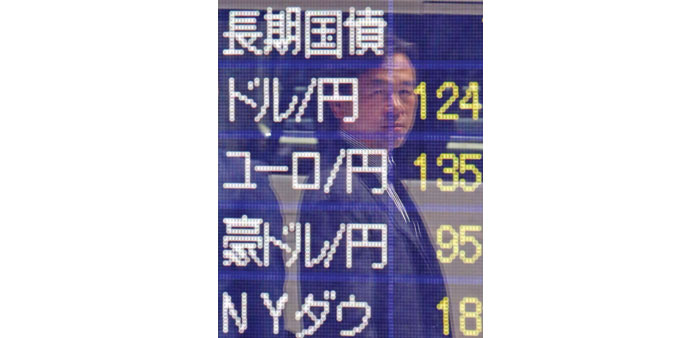A pedestrian is reflected in an electronic board showing exchange rates between (from 2nd row to 4th row) the Japanese yen against the US dollar, the euro, and Australian dollar outside a brokerage in Tokyo. The Japanese currency fell to 124.46 a dollar on Thursday, the weakest level since late 2002.
Bloomberg
Tokyo
The yen’s slide to a 12-year low is drawing the ire of authorities in South Korea and Taiwan as the two economies seek to reverse a drop in exports.
The Japanese currency fell to 124.46 a dollar on Thursday, the weakest level since late 2002, as an improving US economy boosted bets the Federal Reserve will raise interest rates this year. The yen has tumbled 18% against the greenback in the past 12 months as Japan pressed ahead with record monetary stimulus, while the won lost 7.9% and Taiwan’s dollar fell 2.1%.
Exporters from the three economies compete globally to sell everything from cars to electronics and the yen’s slide risks exacerbating a currency war between them. The Korea International Trade Association called for policymakers in Seoul to steady the exchange rate on Thursday as Taiwan’s central bank stepped up intervention to weaken its currency. South Korea is prepared to intervene in the foreign-exchange market if yen weakness persists, a finance ministry official said on Friday.
The Taiwan dollar and the won “are lagging the yen’s move, and over the longer term they will catch up,” said Eddie Cheung, a foreign-exchange strategist at Standard Chartered in Hong Kong. “Northeast Asian exports have been weak, so that should argue that there’s probably a bit more room for downside for these two currencies.” While exports from South Korea and Taiwan fell in at least three of the first four months of this year, Japan’s increased by 9% on average. Apart from having to contend with the weakening yen, Taiwanese and Korean exporters are also facing slowing demand from China, their biggest market, and a drop in the euro that’s improving the competitiveness of European goods.
Taiwan’s dollar has strengthened 19% against the yen in the past 12 months, while the won climbed 12%. The euro fell 2.2% against the yen and tumbled 20% against the dollar. China’s economy grew 7% in the first quarter, the slowest expansion in six years.
While Taiwan’s central bank regularly weakens its currency in the run-up to the close, it took the rare step of doing so before the midday trading break on Thursday, when the local dollar fell 0.3% during the final minute of the morning trading session. It dropped 0.6% in the last 49 minutes of afternoon trading to close 0.3% lower for the day.
“The context of serial disappointment from exports, and continuing deflation makes the central bank more likely to engineer a weaker currency,” Mirza Baig, Singapore-based head of foreign exchange and interest-rate strategy at BNP Paribas SA, wrote in a report on Friday. “It’s to maintain parity with regional peers.”
The Federation of Korean Industries on Friday called on Korea’s government to halt the won’s advance versus the yen, the third manufacturers’ group in the nation to ask for such action this week. The country’s trade association said on Thursday that more than half of 307 exporters it surveyed expect shipments to miss targets if the won stays around 9 per yen this year. The exchange rate was 8.94 as of 3:38 pm in Seoul and breached 8.90 this week for the first time since 2008.
The International Monetary Fund said in a May 13 report the won appears to be weaker than the level consistent with fundamentals. Foreign-exchange interventions should be limited to smoothing excessive volatility, not preventing needed adjustments, it said. The US Treasury said last month that it had stepped up discussions with South Korea over its exchange- rate intervention, which appeared to have “substantially increased” in December and January.
South Korea and Taiwan aren’t likely to cut borrowing costs to weaken their currencies, although the Bank of Korea has an easing bias, said Irene Cheung, a currency strategist at Australia & New Zealand Banking Group in Singapore.

